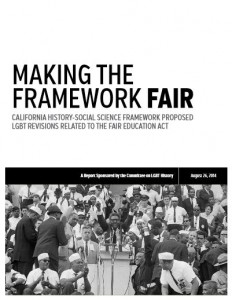 SAN FRANCISCO – As the California Department of Education goes into its public process to update the state’s K-12 History-Social Science Framework, the Committee on Lesbian, Gay, Bisexual and Transgender (LGBT) History has released Making the Framework FAIR: California History-Social Science Framework Proposed LGBT Revisions Related to the FAIR Education Act. In 2011, the FAIR Education Act amended the state’s Education Code to ensure that the roles and contributions of LGBT people and people with disabilities are honestly portrayed in K-12 history instruction. Making the Framework FAIR urges the Department of Education to embrace a transformational approach that expands students’ abilities to understand gender and sexuality as changing historical categories and lenses for analyses. This report has the input of 20 leading scholars of LGBT history as well as feedback from Californian K-12 educators. Adopting the proposed revisions will bring the Framework up to date, so that today’s students get an education of the past that prepares them for today’s realities. This will, in turn, promote the participation of an active, responsible citizenry in our increasingly diverse society. Making the Framework FAIR can also serve as a best-practices template for similar efforts toward ending the exclusion of LGBT history from K-12 education across the country.
SAN FRANCISCO – As the California Department of Education goes into its public process to update the state’s K-12 History-Social Science Framework, the Committee on Lesbian, Gay, Bisexual and Transgender (LGBT) History has released Making the Framework FAIR: California History-Social Science Framework Proposed LGBT Revisions Related to the FAIR Education Act. In 2011, the FAIR Education Act amended the state’s Education Code to ensure that the roles and contributions of LGBT people and people with disabilities are honestly portrayed in K-12 history instruction. Making the Framework FAIR urges the Department of Education to embrace a transformational approach that expands students’ abilities to understand gender and sexuality as changing historical categories and lenses for analyses. This report has the input of 20 leading scholars of LGBT history as well as feedback from Californian K-12 educators. Adopting the proposed revisions will bring the Framework up to date, so that today’s students get an education of the past that prepares them for today’s realities. This will, in turn, promote the participation of an active, responsible citizenry in our increasingly diverse society. Making the Framework FAIR can also serve as a best-practices template for similar efforts toward ending the exclusion of LGBT history from K-12 education across the country.
“Making the Framework FAIR shows how the California Department of Education should take the opportunity of the FAIR Education Act to bring the state’s K-12 History Framework into the 21st century,” said report lead editor Don Romesburg, a professor at Sonoma State University and co-chair of the Committee on LGBT History. “As surely as the inclusion of people of color, women, and people with disabilities transforms the way the past is understood, so does the incorporation of gender-based analyses and an appreciation of changing sexual identities and politics. Merely additive references to figures such as Harvey Milk are not enough. History education should capture scholarship-based understandings of how families, communities, social practices, policy, and politics across all of U.S. history shaped and were shaped by diverse forces. Students deserve to learn in ways that empower them with tools to conduct diverse forms of analysis, multiple interpretations of evidence, and exploration of change and continuity over time. This report’s proposed revisions do just that.”
In brief, recommended Framework revisions by grade and theme include:
· Grade 2: LGBT families in the context of understanding family diversity as a contemporary and historical reality
· Grade 4: Central roles played by gender and sexuality in California’s history as a site of rich, contested, and changing diversity
· Grade 5: Variation over time, region, and culture in colonial American practices and laws with regard to gender and sexuality
· Grade 8: Fundamental transformations in gender and sexuality in conjunction with nineteenth-century urbanization and industrialization
· Grade 11: The evolution of modern LGBT communities and identities; twentieth-century persecution of sexual and gender minorities and the growth of the LGBT civil rights movement
In Summer 2014, a focus group of K-12 educators gave Making the Framework FAIR a test run. Response was positive, suggesting that revisions would be a relief and support legally mandated work that teachers wanted to do but did not necessarily have the background to implement. One educator said, “In my school the teachers would appreciate … the richness that [the proposed revisions] provide for their own teaching.” Similarly, one teacher noted that because the transformational approach does not “add another unit, it’s not one more thing to squeeze in the year.” Rather, she said, it is, “‘Let’s reframe how we’re teaching and look at it through a different lens’.”
Over a dozen historians from around the nation made revision suggestions. They focused on LGBT history but included related material on gender, race, class, and disability. An Executive Committee made up of Don Romesburg (Sonoma State University), Leila Rupp (University of California, Santa Barbara), and David Donahue (Mills College) evaluated revisions and justifications for accuracy, relevance to the U.S. history survey, and grade-appropriate content. The final report includes recommended revisions, scholarship-supported justifications, and suggested resources for teachers.











